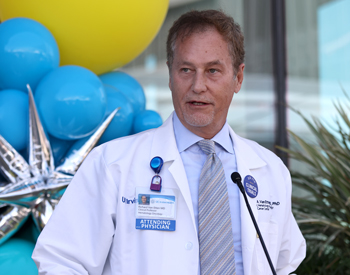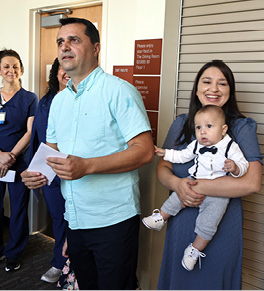High-Risk Pregnancy Services
Doctors use the term “high risk” to describe a pregnancy in which the mother or the baby may experience medical complications due to a newly developed or pre-existing disorder. This includes conditions or situations that could threaten the well being of the mother or child such as:
|
|
As many as 10% of pregnancies are considered high risk, but with expert care, 95% of these special cases result in the birth of healthy babies. UCI Medical Center is the only facility in Orange County offering specialized care in one location for high-risk expectant mothers and their babies.
To make an appointment, call 714-456-2911.
The Fetal Care Center of Southern California
A joint program between UCI Health and CHOC, the Fetal Care Center of Southern California brings together experts to care for pregnant individuals, fetuses and families when a congenital anomaly is suspected.
The multidisciplinary fetal care center is the only one of its kind in Orange County and joins Maternal-Fetal Medicine and Pediatric specialists to provide comprehensive consultative and diagnostic services, specializing in prenatal diagnosis, treatment planning and care coordination. During one visit to the center, family have access to obstetrical ultrasound, fetal echocardiogram and ultrafast MRI if indicated. They may meet with multiple specialists for a multidisciplinary perspective and team approach to planning care during the pregnancy, delivery and transition to postnatal life.
Our team
Our high-risk obstetrics team offers a comprehensive program of services to protect both mother and child during pregnancy and immediately after birth. This well-coordinated continuum of care from pregnancy through neonatal care and beyond has earned UCI Medical Center some of the best outcomes in the nation for the management of complicated pregnancies. Features of the program include:
- Multidisciplinary approach
Our in-house physician specialists include obstetricians, perinatologists (experts in high-risk pregnancy), geneticists, endocrinologists (specialists in the endocrine system and hormones, including diabetes), radiologists, cardiologists and neonatologists (experts in the care of high-risk newborns).
- Highly coordinated care
Our high-risk maternal-fetal team works together, providing consistent, comprehensive care throughout pregnancy and childbirth.
- Access to subspecialists
As a university hospital medical center, we are able to offer the services of many specialists, if needed, including more than 55 types of pediatric subspecialists.
- Combined perinatal-neonatal program
Continuity of care is extremely important for high-risk women. If fetal testing indicates a baby has a congenital problem, our maternal-fetal specialists make plans to treat it immediately. Additionally, if premature labor is likely, neonatologists and perinatologists can work together to delay the birth. Every extra day in the womb gives the baby’s lungs and other vital organs more time to develop.
- Neonatal intensive care unit (NICU)
Our NICU is one of only two neonatal intensive care nurseries in Orange County accredited to care for the smallest and sickest newborns. Because we are experts in this field, many expectant mothers in premature labor are transported to UCI Medical Center from other hospitals to receive specialized care. So are hundreds of high-risk infants who are born at other facilities. Our neonatologists are now saving babies born up to 23 weeks prematurely, and weighing a little less than a pound.
Our high-risk obstetricians are:
Research
We are a world-renowned, university hospital medical center known for our outstanding patient care, advanced research and state-of-the-art technology.
We are fortunate to have been funded by the National Institutes of Health for the fetal growth and NuMoM2B studies. Both studies will revolutionize the way obstetric care is provided in the United States. UCI Medical Center has also been the site of many other medical breakthroughs, including the use of nitric oxide therapy to treat life-threatening breathing problems in infants.
Our services
Our goal with high-risk pregnancies is to prevent premature labor throughout the full term of the pregnancy—or to keep delivery as close to term as possible. To achieve this goal, we employ a number of strategies to prevent premature labor, beginning with low-tech remedies such as bed rest and the administration of intravenous fluids. We also have the option of using medications called tocolytics that relax the uterus and help to stop labor.
Other services we offer to mothers-to-be include:









